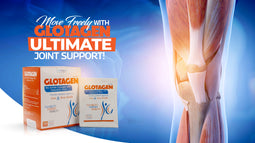
Introduction: Why Understanding Collagen Types Could Be Your Anti-Aging Breakthrough
If you're over 35 and noticing the first signs of aging — like fine lines, joint stiffness, or reduced skin elasticity — collagen might already be on your radar. But did you know that not all collagen is the same? Understanding the differences between Type I, II, and III collagen is crucial to addressing your specific health concerns effectively.
Whether you're looking to maintain youthful skin, reduce joint discomfort, or support overall longevity, choosing the right type of collagen can make all the difference.
What is Collagen and Why Is It So Important?
Collagen is the most abundant protein in the human body. It acts like the glue that holds everything together — your skin, bones, tendons, and cartilage. But after the age of 25, your natural collagen production begins to decline by about 1.5% every year.
That’s why collagen supplements have gained popularity, especially among those seeking natural solutions for:
-
Wrinkle reduction
-
Joint support and flexibility
-
Gut and bone health
"Collagen is like scaffolding for your body. When it breaks down, everything starts to sag or weaken." — Dermatologist Dr. Whitney Bowe
Type I Collagen – The Beauty Booster for Skin, Hair, and Nails
Type I collagen makes up over 90% of your body’s collagen and is primarily found in:
-
Skin
-
Tendons
-
Ligaments
-
Bones
-
Hair and nails
Benefits:
-
Improves skin elasticity and hydration
-
Reduces fine lines and wrinkles
-
Strengthens hair and nails
-
Speeds up wound healing
Real-life Example: Women in their 40s who begin a consistent collagen routine often notice smoother skin and fewer wrinkles in as little as 8 weeks.
Best Source: Marine collagen and Glotagen by Sois Life Sciences, which contains Type I and III collagen peptides that are easily absorbed.
Type II Collagen – The Joint Saver
Type II collagen is primarily found in cartilage and is essential for joint cushioning and flexibility.
Benefits:
-
Supports joint mobility
-
Reduces stiffness and inflammation
-
Helps with arthritis and cartilage repair
Ideal For:
-
People with knee or joint discomfort
-
Individuals recovering from injury
-
Adults 40+ experiencing stiffness
Top Product Pick: The Glotagen Wellness Bundle combines Type II collagen with anti-inflammatory ingredients, designed to relieve pain and rebuild joint strength.
Type III Collagen – The Skin & Gut Ally
Type III collagen is often found alongside Type I in skin, muscles, and blood vessels.
Benefits:
-
Enhances skin firmness and hydration
-
Improves gut lining and digestion
-
Supports vascular and heart health
Fact: A lack of Type III collagen has been linked to weak skin tone and aging blood vessels.
Combine It With: Type I collagen for complete skin and tissue support. The Glotagen powder includes both.
Which Type of Collagen is Right for You?
| Concern | Recommended Type |
|---|---|
| Wrinkles, Skin Firmness | Type I & III |
| Joint Pain, Mobility | Type II |
| Gut or Heart Health | Type III |
| Overall Anti-Aging | Type I, II, & III |
If you’re unsure, a multi-type collagen supplement like Glotagen is a safe, effective choice.
Collagen Supplements vs Collagen Foods
Natural Sources of Collagen:
-
Bone broth
-
Fish skin
-
Chicken cartilage
-
Egg whites
But here’s the catch: These foods don’t provide specific types in concentrated form. That’s why hydrolyzed collagen powder or collagen sachets are recommended for fast absorption and measurable results.
Tip: Combine with Vitamin C (found in citrus fruits and bell peppers) to boost collagen synthesis.
Related Reading to Deepen Your Collagen Knowledge
FAQs – What People Also Ask
Q1: What does collagen do in the body?
Collagen supports skin elasticity, joint cushioning, bone strength, and gut integrity.
Q2: Which food is rich in collagen?
Bone broth, fish skin, chicken cartilage, and egg whites are collagen-rich foods.
Q3: Is collagen from vitamin C?
No, but vitamin C helps produce collagen in the body by activating key enzymes.
Q4: Is it good to take collagen every day?
Yes! Daily collagen intake improves consistency and long-term results for skin, joints, and overall vitality.
Conclusion: Choose the Right Collagen and Age Gracefully
When it comes to slowing down aging and feeling your best, understanding collagen types is key. Whether you're targeting wrinkles, joint stiffness, or gut health, matching your supplement to the right type of collagen is the game-changer.
Ready to take control of aging? Explore Glotagen and our complete Joint Support Collection for trusted, effective, halal-certified collagen options.
Feel the difference in your skin, joints, and energy — naturally.
References:
-
Bowe, Whitney. "The Beauty of Dirty Skin." 2018.
-
https://www.webmd.com/diet/what-to-know-about-collagen-supplements




















